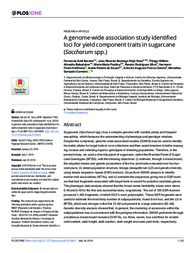A genome-wide association study identified loci for yield component traits in sugarcane (Saccharum spp.).
A genome-wide association study identified loci for yield component traits in sugarcane (Saccharum spp.).
Author(s): BARRETO, F. Z.; ROSA, J. R. B. F.; BALSALOBRE, T. W. A.; PASTINA, M. M.; SILVA, R. R.; HOFFMANN, H. P.; SOUZA, A. P. de; GARCIA, A. A. F.; CARNEIRO, M. S.
Summary: Sugarcane (Saccharum spp.) has a complex genome with variable ploidy and frequent aneuploidy, which hampers the understanding of phenotype and genotype relations. Despite this complexity, genome-wide association studies (GWAS) may be used to identify favorable alleles for target traits in core collections and then assist breeders in better managing crosses and selecting superior genotypes in breeding populations. Therefore, in the present study, we used a diversity panel of sugarcane, called the Brazilian Panel of Sugarcane Genotypes (BPSG), with the following objectives: (i) estimate, through a mixed model, the adjusted means and genetic parameters of the five yield traits evaluated over two harvest years; (ii) detect population structure, linkage disequilibrium (LD) and genetic diversity using simple sequence repeat (SSR) markers; (iii) perform GWAS analysis to identify marker-trait associations (MTAs); and iv) annotate the sequences giving rise to SSR markers that had fragments associated with target traits to search for putative candidate genes. The phenotypic data analysis showed that the broad-sense heritability values were above 0.48 and 0.49 for the first and second harvests, respectively. The set of 100 SSR markers produced 1,483 fragments, of which 99.5% were polymorphic. These SSR fragments were useful to estimate the most likely number of subpopulations, found to be four, and the LD in BPSG, which was stronger in the first 15 cM and present to a large extension (65 cM). Genetic diversity analysis showed that, in general, the clustering of accessions within the subpopulations was in accordance with the pedigree information. GWAS performed through a multilocus mixed model revealed 23 MTAs, six, three, seven, four and three for soluble solid content, stalk height, stalk number, stalk weight and cane yield traits, respectively. These MTAs may be validated in other populations to support sugarcane breeding programs with introgression of favorable alleles and marker-assisted selection
Publication year: 2019
Types of publication: Journal article
Unit: Embrapa Maize & Sorghum
Observation
Some of Embrapa's publications are published as ePub files. To read them, use or download one of the following free software options to your computer or mobile device. Android: Google Play Books; IOS: iBooks; Windows and Linux: Calibre.
Access other publications
Access the Agricultural Research Database (BDPA) to consult Embrapa's full library collection and records.
Visit Embrapa Bookstore to purchase books and other publications sold by Embrapa.

